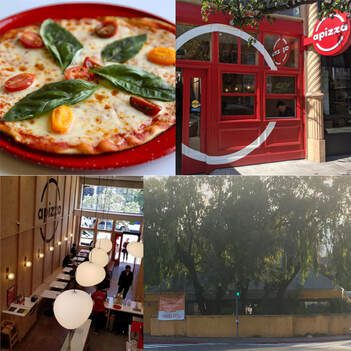 Scenes from Apizza’s only current location in San Francisco, at top and left, and its proposed location at 590 East Blithedale, at bottom right.
Scenes from Apizza’s only current location in San Francisco, at top and left, and its proposed location at 590 East Blithedale, at bottom right.
The five trees were determined by an arborist to be non-heritage trees, according to Lisa Newman, a senior planner with the city. The commission backed the request to remove five 50-foot trees and replace them with red maples – up to 11 trees, each with a 48-inch box.
Bay Area food industry vets Pascal Rigo and Nicolas Bernadi have been hoping to change that, leasing the building with the hopes of making it one of the locations for La Boulangerie, the post-Starbucks, slightly renamed rebirth of their popular La Boulange cafes and eateries. They shifted gears earlier this year and decided to make the space home to Apizza, their simple, affordable pizza shop that already has a successful location on Fillmore Street in San Francisco.
Architect Christopher Raker, representing Apizza, told the Council that the removal of the trees, a costly endeavor, was vitally important to the project and its economic viability because “we don’t have the budget to do a new building but what we do have is a chance is to open the site up and draw people in. “The landscape plan is the most important element of this whole project.”
“We need to do everything we can to give this a project a chance for economic success,” he added.
Susan Kirsch, representing the neighborhood association, which submitted the majority of the more then 40 public comments on the matter, said the removal of the trees and replacement with younger trees would “permanently and irrevocably” change the intersection.
“We call on you to not be the council who will have a legacy of cutting down the trees to an urbanized intersection,” she added. “In light of the uncertainty of a global pandemic, we urge you to keep stability and serenity for the people of Mill Valley.”
Councilmembers each indicated that it was a difficult decision but that their decision came down to the property rights of the applicant. “I am deeply concerned about empty storefronts in Mill Valley and particularly restaurants,” Vice Mayor John McCauley said. “This is private property. These aren’t heritage trees. This is a commercial location. The owner is taking significant risk – it would have been easier for them to leave the trees.”
McCauley leaned on the Good Neighbor policy within the City’s MV2020 General Plan when it comes to addressing potential conflicts between businesses and residents in or adjacent to commercial areas “by acknowledging that residents who enjoy the value and convenience of living in or near commercial areas may also experience noise, odors, parking constraints, and other issues not typically found in traditional residential areas; and by recognizing that the resolution of any conflict with adjacent residents should take into account reasonable concerns and consider the importance of maintaining a vibrant commercial area.”
“The issue is that the question has been misframed,” added Councilmember Urban Carmel said. “I get the sense that people have the impression that it’s a ‘save the trees’ or ‘not save the trees’ kind of issue. And that’s not the issue. The issue is whether the property owner has the right to take down those trees and they do.”
